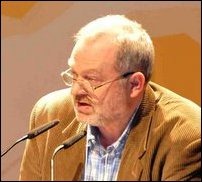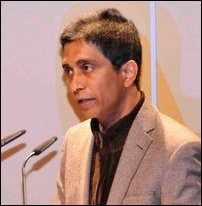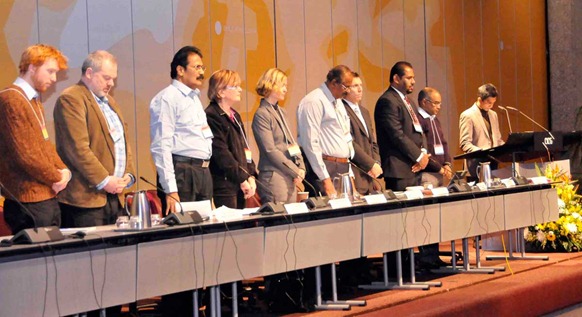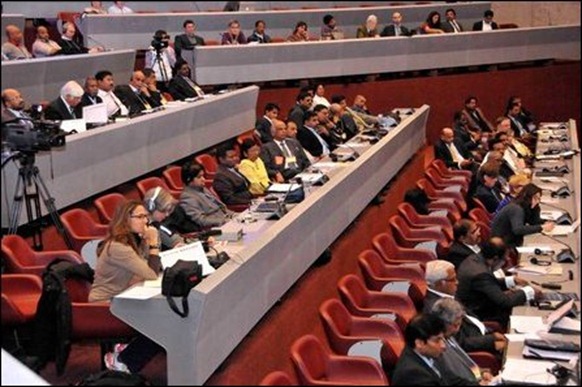Even as certain groups of the establishments are suggesting the Responsibility to Protect (R2P) doctrine to the Eezham Tamils, the concept has come under severe criticism by academics who attended the “Conference on Tamil People’s Rights” at Geneva on 02 March. While British academic Dr. Andy Higginbottom argued that R2P was “a humanitarian face to further US interests”, Ireland based Sinhala academic Dr. Jude Lal Fernando stated that “At a time when the powers are giving economic diplomatic and military support to the Sri Lankan state, talking about R2P is nonsensical”, in their opinions conveyed to TamilNet. Dr. Fernando also stressed the need for “the application of remedial sovereignty by means of an UN referendum conducted by powers who were not involved in the genocide.”
 The Conference at Geneva, organized by the Country Councils across the West, and participated by politicians from the TNPF and the TNA, several diaspora organizations, political activists from Tamil Nadu, solidarity activists, academics and politicians, had three sessions namely on independent international investigation, genocide and UN monitored referendum.
The Conference at Geneva, organized by the Country Councils across the West, and participated by politicians from the TNPF and the TNA, several diaspora organizations, political activists from Tamil Nadu, solidarity activists, academics and politicians, had three sessions namely on independent international investigation, genocide and UN monitored referendum.
Dr. Higginbottom, principal lecturer of Politics and Human Rights at Kingston University, who had chaired the second session on genocide, expressed his opinion to TamilNet that R2P was unfeasible in the case of the Eezham Tamils and that it was only “a humanitarian face to further US interests”.
 “The genocide was planned by the intervention of the major powers. The last place from where the Tamils will get support is from the US and Britain considering the history of their state policies,” he said.
“The genocide was planned by the intervention of the major powers. The last place from where the Tamils will get support is from the US and Britain considering the history of their state policies,” he said.
In his presentation at the conference, he had given a brief context of the usage of the R2P and its inapplicability to the Eezham Tamils, urging them to “create our own process and on that basis seek international allies who are prepared to stand up to imperialist power to uncover the truth and also to defend Tamil rights, including the right to self-determination as Tamil Eelam.”
Sinhala academic Dr. Fernando, lecturer at Trinity College, Dublin, who had chaired the other two sessions, told TamilNet “At a time when the powers are giving economic diplomatic and military support to the Sri Lankan state, talking about R2P is nonsensical.”
He further said that in the case of Sri Lanka, R2P had already been applied by the internationally backed genocide-accused Sri Lankan military to protect the Sri Lankan state.
“It is not lack of information that led to deaths of Tamils. It was a lack of political will. It was a political will to protect Sri Lankan state structure. Even now, the West wants the Sri Lankan state to have full power over the North and East, so that there wouldn’t be a Tamil identity over a geographically contiguous arena,” he said.
At the conference, he had expressed the opinion that more than the Tamil diaspora needing the West, the West needed the diaspora as a tool to pressurize Mahinda to bring him closer to western interests and that their interest was not to bring a halt to the structural genocide or to bring political justice to the Tamils.
“In order to remedy what has happened and to stop what is going on, that is, structural genocide, there should be a political solution by the application of remedial sovereignty by means of an UN referendum conducted by powers who were not involved in the genocide,” he told TamilNet.
The conference at Geneva had passed a resolution that criticized attempts to address the injustices meted out to the Tamils through internal mechanisms of the genocide-accused Sri Lankan state, calling for an independent international investigation into the charges of genocide and crimes against humanity.
The resolution further pushed for an international decision to conduct and monitor a referendum among the Eezham Tamils to enable them to ascertain their political future.
There was however a criticism that this resolution, which had reference to historical and earned sovereignty of the Eezham Tamil nation, had omitted a crucial mention of remedial sovereignty.
Informed circles told TamilNet that the original draft prepared by a committee and that included remedial sovereignty was later modified by some individuals, before it was tabled at the conference.
PDF: Resolutions passed in the confrerence held in Geneva on 03 March 2013


(For updates you can share with your friends, follow TNN on Facebook and Twitter )
